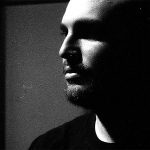Recent Graduates

William Walker
Spring 2021
Abstract
I’ll See You in the Morning explores the relationship between the choices we make and the consequences we bring on ourselves and others. The characters of this collection all struggle with decisions that have unforeseen results, and decisions that cannot be taken back. Their stories probe the obscure fault-line that exists at the collision of free will and deterministic fate, between nature and morality. Characters will face temptation – a submarine filled with cocaine, an undead lover in the crawlspace, a journey across an exposed ocean floor – and they will have to weigh their desires against the needs and safety of others. The choices these characters make may be selfish or harmful, but each will try to do the best they can with what they have.
Excerpt
Everett stood over his sleeping son’s hospital bed, looking at him. Eggshell skin, baby blonde hair. The boy sucked absently at a pacifier. He would never outgrow it. Burton was not sure how, but he knew. The doctors had told them there could still be a miracle, it was not likely but it could still happen, and Kate still held onto that, but Burton knew that without an abundance of horror there could be no miracles. His son would not leave this hospital. And then what? Without Jack, he and Kate were strangers, no longer moored to each other by responsibility and resentment. And without Kate, the carefully laid tracks of his life collapsed before him. He could do anything. It was frightening and, somewhere in there, exciting too.
But he was not being honest, and he knew it. There could be a miracle. The boy could be spared. The track rebuilt. Life restored. And to him that was more frightening than anything else. A known end. A long march over a tall cliff. He tried not to, but he hoped there would be no miracle. He hated himself for it, but he had fantasized of his son’s death since the diagnosis. All his talk of horror and grace had been what his sponsor had called bullshit.

Rebecca Fox
Spring 2021
Abstract
What if the sun disappeared but the world didn’t end? A boy with wings fell out of the sky? A piano prodigy vanished but the disappearance didn’t stick? Sunseekers is a collection of short stories that explores the intersections of memory, identity, and narrative. How do the stories we hear, tell, and internalize shape the people we are becoming and the worlds we are making? Stories stay with us. They shape us, and they change us. The longer they sit within us, the more they begin to interpret our pasts, define our presents, and set trajectories for our futures. And as the boundaries of memory are blurred, so are the patterns of time. In Sunseekers, the traditions of magical realism, fairy tale, and literary realism intersect as characters and their narratives are exposed to the wild and startling fabric of the world as it is.
Excerpt
When the Shade appeared, first a lengthening shadow and then sinking across the sky from either pole like a theatre curtain closing, we braced ourselves for what would come next – a meteor strike, maybe, a burst of flame and then nothing, or even a long freeze like a fist tightening. Instead, the Shade swallowed the world into a thick darkness that never wavered, and that was it.
My father noticed, if not first then sooner than most, the signs of what was coming. At the kitchen table, he puzzled over papers printed with tiny points of data. I overheard him repeat the word “irregularities” to my mother. Dad was an astronomer. A professor at the small college where I attended and my brother, Caleb, had gone before medical school and the youngest, Thea, would have gone if she hadn’t run off to Europe with friends as soon as she turned eighteen. From the observatory Dad operated—a small brick building with a balcony and a dome built on a hill at the edge of campus—he spied the overtures of the shadows, the way the daylight was shrinking, imperceptible to the naked eye, although it was springtime, supposedly reaching for summer. But it didn’t matter that Dad had felt a premonition or that he hadn’t been able to find anyone to pay attention to his findings or even that he wouldn’t have known what warning to give if someone had listened, because the Shade caught up with the world and there wasn’t anything anyone could do to stop it or turn it back or even explain how the world could get stuck halfway through its ending.

William Walker
Spring 2021
Abstract
I’ll See You in the Morning explores the relationship between the choices we make and the consequences we bring on ourselves and others. The characters of this collection all struggle with decisions that have unforeseen results, and decisions that cannot be taken back. Their stories probe the obscure fault-line that exists at the collision of free will and deterministic fate, between nature and morality. Characters will face temptation – a submarine filled with cocaine, an undead lover in the crawlspace, a journey across an exposed ocean floor – and they will have to weigh their desires against the needs and safety of others. The choices these characters make may be selfish or harmful, but each will try to do the best they can with what they have.
Excerpt
Everett stood over his sleeping son’s hospital bed, looking at him. Eggshell skin, baby blonde hair. The boy sucked absently at a pacifier. He would never outgrow it. Burton was not sure how, but he knew. The doctors had told them there could still be a miracle, it was not likely but it could still happen, and Kate still held onto that, but Burton knew that without an abundance of horror there could be no miracles. His son would not leave this hospital. And then what? Without Jack, he and Kate were strangers, no longer moored to each other by responsibility and resentment. And without Kate, the carefully laid tracks of his life collapsed before him. He could do anything. It was frightening and, somewhere in there, exciting too.
But he was not being honest, and he knew it. There could be a miracle. The boy could be spared. The track rebuilt. Life restored. And to him that was more frightening than anything else. A known end. A long march over a tall cliff. He tried not to, but he hoped there would be no miracle. He hated himself for it, but he had fantasized of his son’s death since the diagnosis. All his talk of horror and grace had been what his sponsor had called bullshit.

Rebecca Fox
Spring 2021
Abstract
What if the sun disappeared but the world didn’t end? A boy with wings fell out of the sky? A piano prodigy vanished but the disappearance didn’t stick? Sunseekers is a collection of short stories that explores the intersections of memory, identity, and narrative. How do the stories we hear, tell, and internalize shape the people we are becoming and the worlds we are making? Stories stay with us. They shape us, and they change us. The longer they sit within us, the more they begin to interpret our pasts, define our presents, and set trajectories for our futures. And as the boundaries of memory are blurred, so are the patterns of time. In Sunseekers, the traditions of magical realism, fairy tale, and literary realism intersect as characters and their narratives are exposed to the wild and startling fabric of the world as it is.
Excerpt
When the Shade appeared, first a lengthening shadow and then sinking across the sky from either pole like a theatre curtain closing, we braced ourselves for what would come next – a meteor strike, maybe, a burst of flame and then nothing, or even a long freeze like a fist tightening. Instead, the Shade swallowed the world into a thick darkness that never wavered, and that was it.
My father noticed, if not first then sooner than most, the signs of what was coming. At the kitchen table, he puzzled over papers printed with tiny points of data. I overheard him repeat the word “irregularities” to my mother. Dad was an astronomer. A professor at the small college where I attended and my brother, Caleb, had gone before medical school and the youngest, Thea, would have gone if she hadn’t run off to Europe with friends as soon as she turned eighteen. From the observatory Dad operated—a small brick building with a balcony and a dome built on a hill at the edge of campus—he spied the overtures of the shadows, the way the daylight was shrinking, imperceptible to the naked eye, although it was springtime, supposedly reaching for summer. But it didn’t matter that Dad had felt a premonition or that he hadn’t been able to find anyone to pay attention to his findings or even that he wouldn’t have known what warning to give if someone had listened, because the Shade caught up with the world and there wasn’t anything anyone could do to stop it or turn it back or even explain how the world could get stuck halfway through its ending.







